

|
 Pancakes of pudding batter, lightly cooked on both sides, typically 8" diameter by 1/8" thick. Served hot rolled-up with sugar (or honey) and lemon on 'Pancake Day' - Shrove Tuesday. To Christians, Shrove Tuesday, a variable celebration falling some time between February 2 and March 9, is the last chance to feast on forbidden foods - principally meat - before the 40-day Lenten fast begins on Ash Wednesday. The period is celebrated in many parts of the world in many different ways and under different names, including 'Mardi Gras' and 'Carnival', which comes from the Latin meaning 'a leaving (levare) of meat (carne)'. 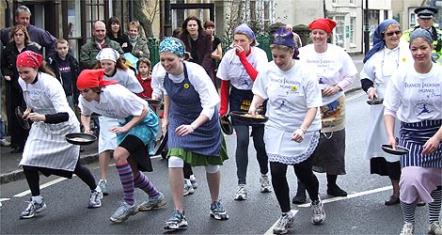 Olney Pancake Day Race, 2007 Image: BBC There is sometimes a suggestion that English Shrovetide pancakes were formerly rather grand confections, made to use-up all those forbidden foods. If true, this would be extremely odd as late winter is not a time when there are surplus perishable foods around. Not only can we find no evidence at all for such a dish, but Shrove Tuesday pancakes are made entirely of ingredients generally permitted during the fast. In any case, while abstinence during Lent, to promote self-discipline and heighten spiritual awareness, is a tradition enjoined by the Church since ancient times, it has always been left to the individual to decide precisely what they should abstain from. The usual story, here from the 1815 'Clavis Calendaria; or, A compendious analysis of the calendar' by John Brady is that the tradition comes from; "the antient practice of shriving or confessing [where] prior to the Reformation every communicant throughout the kingdom was obliged individually to confess to his parish priest. ... After the people had made the confession required at this season by the discipline of the antient church they were permitted to indulge in festive amusements although not allowed to partake of any repasts beyond the usual substitutes for flesh. Hence arose the custom yet preserved of eating Pancakes and Fritters at Shrovetide which has given this day the vulgar appellation of Pancake Tuesday while it is to be remembered that the Monday preceding this day was by the vulgar called Collop Monday a name it even yet retains in some places from the primitive custom of regaling with eggs." 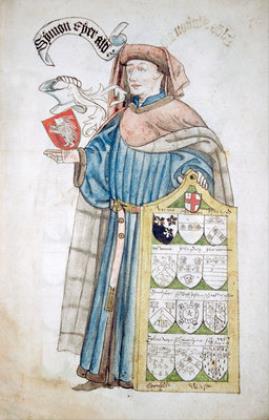 Sir Simon Eyre, Lord Mayor of London, 1445 But another story is that Pancake Day began with Sir Simon Eyre, who, on becoming Lord Mayor of London in 1445 celebrated his own humble beginnings as a craftsman by inviting all the apprentices of the city to a luncheon. The day was Shrove Tuesday, and what tasty, filling, but simple and inexpensive treat do you serve to several hundred hungry young mouths? Pancakes. In gratitude for the much-needed day off, the apprentices continued this annually as a tradition. From this, the usual 11.00am ringing of Church Bells to announce the holiday came to be known as the 'pancake bells'. This story, with embellishments, forms the centre of the play of c1600 'The Shoemaker’s Holiday' by Thomas Dekker.  The Shoemaker's Holiday 1953 Program cover Hartley 1954 declares that; "Abroad pancakes are usually open and piled up together. In England our pancakes are symbols of our insular detachment, for each is rolled up by itself, aloof, with its own small slice of lemon." and provides an illustration ... 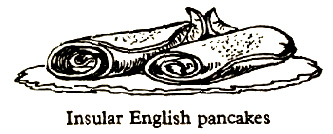  Original Receipt in 'The Accomplisht Cook' by Robert May, 1660 (Robert May 1660); Original Receipt in 'The Accomplisht Cook' by Robert May, 1660 (Robert May 1660);To make Pancakes. Take three pints of cream, a quart of flour, eight eggs, three nutmegs, a spoonful of salt, and two pound of clarified butter; the nutmegs being beaten, strain them with the cream, flour and salt, fry them into pancakes, and serve them with fine sugar. There is a tradition that Pancake racing began in the village of Olney in Buckinghamshire in 1445 when a tardy cook had to run to the church with her pancakes, either to be in time for confession, or as a bribe to encourage the bell-ringers to sound out the beginning of the holiday. A race is still run there, and in many other towns and villages. At Westminster School in London, the annual 'Pancake Grease' involves the boys fighting to grab a piece from a giant pancake tossed over a high bar by the school cook. Video of Westminster 'Pancake Grease' There is a Midlands tradition that the first pancake made should be given to the chickens to ensure their fertility during the coming year. There is also a, largely lost, tradition of 'Shroving', of going door-to-door, sometimes in disguise, demanding pancakes. In one version, called Lent Crocking or Lensharding, failure to be given pancakes meant having broken crockery thrown at your door. 'Knock, knock, the pan's hot And we are coming a-shroving For a piece of pancake Or a piece of bacon Or a piece of truckle cheese Of your own making.'  Original Receipt from 'A Plain Cookery Book for the Working Classes' by Charles Elme Francatelli (Francatelli 1846) Original Receipt from 'A Plain Cookery Book for the Working Classes' by Charles Elme Francatelli (Francatelli 1846)No. 105. PANCAKES FOR SHROVE TUESDAY. Ingredients, twelve ounces of flour, three eggs, one pint of milk, a tea-spoonful of salt, a little grated nutmeg, and chopped lemon-peel. First, put the flour into a basin, hollow out the centre, add the salt, nutmeg, lemon-peel, and a drop of milk, to dissolve them; then break in the eggs, work all together, with a spoon, into a smooth soft paste, add the remainder of the milk, and work the whole vigorously until it forms a smooth liquid batter. Next, set a frying-pan on the fire, and, as soon as it gets hot, wipe it out clean with a cloth, then run about a tea-spoonful of lard all over the bottom of the hot frying-pan, pour in half a small tea-cupful of the batter, place the pan over the fire, and, in about a minute or so, the pancake will have become set sufficiently firm to enable you to turn it over in the frying-pan, in order that it may be baked on the other side also; the pancake done on both sides, turn it out on its dish, and sprinkle a little sugar over it: proceed to use up the remaining batter in the same manner.  Original Receipt in 'The Book of Household Management' edited by Isabella Beeton, 1861 (See Mrs.B) Original Receipt in 'The Book of Household Management' edited by Isabella Beeton, 1861 (See Mrs.B)TO MAKE PANCAKES. 1467. INGREDIENTS. - Eggs, flour, milk; to every egg allow 1 oz. of flour, about 1 gill of milk, 1/8 saltspoonful of salt. 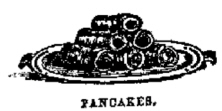 Mode. - Ascertain that the eggs are fresh; break each one separately in a cup; whisk them well, put them into a basin, with the flour, salt, and a few drops of milk, and beat the whole to a perfectly smooth batter; then add by degrees the remainder of the milk. The proportion of this latter ingredient must be regulated by the size of the eggs, &c. &c.; but the batter, when ready for frying, should be of the consistency of thick cream. Place a small frying-pan on the fire to get hot; let it be delicately clean, or the pancakes will stick, and, when quite hot, put into it a small piece of butter, allowing about1/2 oz. to each pancake. When it is melted, pour in the batter, about1/2 teacupful to a pan 5 inches in diameter, and fry it for about 4 minutes, or until it is nicely brown on one side. By only pouring in a small quantity of batter, and so making the pancakes thin, the necessity of turning them (an operation rather difficult to unskilful cooks) is obviated. When the pancake is done, sprinkle over it some pounded sugar, roll it up in the pan, and take it out with a large slice, and place it on a dish before the fire. Proceed in this manner until sufficient are cooked for a dish; then send them quickly to table, and continue to send in a further quantity, as pancakes are never good unless eaten almost immediately they come from the frying-pan. The batter may be flavoured with a little grated lemon-rind, or the pancakes may have preserve rolled in them instead of sugar. Send sifted sugar and a cut lemon to table with them. To render the pancakes very light, the yolks and whites of the eggs should be beaten separately, and the whites added the last thing to the batter before frying. Time. - from 4 to 6 minutes for a pancake that does not require turning; from 6 to 8 minutes for a thicker one. Average cost, for 3 persons, 6d. Sufficient. - Allow 3 eggs, with the other ingredients in proportion, for 3 persons. Seasonable at any time, but specially served on Shrove Tuesday. RICHER PANCAKES. 1468. INGREDIENTS. - 6 eggs, 1 pint of cream,1/4lb. of loaf sugar, 1 glass of sherry,1/2 teaspoonful of grated nutmeg, flour. Mode. - Ascertain that the eggs are extremely fresh, beat them well, strain and mix with them the cream, pounded sugar, wine, nutmeg, and as much flour as will make the batter nearly as thick as that for ordinary pancakes. Make the frying-pan hot, wipe it with a clean cloth, pour in sufficient batter to make a thin pancake, and fry it for about 5 minutes. Dish the pancakes piled one above the other, strew sifted sugar between each, and serve. Time. - About 5 minutes. Average cost, with cream at 1s. per pint, 2s. 3d. Sufficient to make 8 pancakes. Seasonable at any time, but specially served on Shrove Tuesday. For other Shrove Tuesday traditions, see: Doughnuts - Ring form Grey Peas (and Bacon) Pancakes for Shrove Tuesday Monday Collop 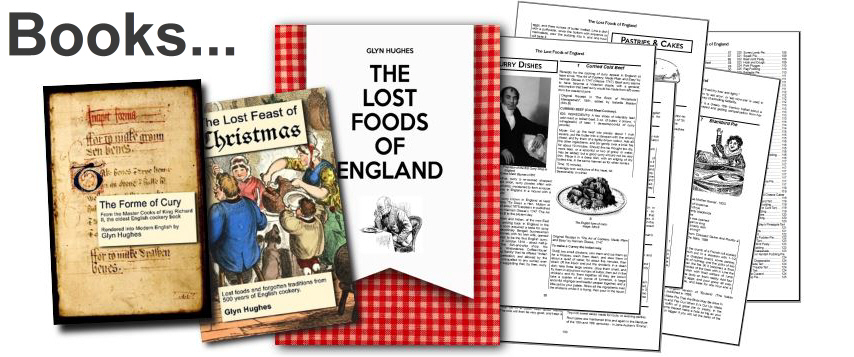 |
|
MORE FROM Foods of England... Cookbooks ● Diary ● Index ● Magic Menu ● Random ● Really English? ● Timeline ● Donate ● English Service ● Food Map of England ● Lost Foods ● Accompaniments ● Biscuits ● Breads ● Cakes and Scones ● Cheeses ● Classic Meals ● Curry Dishes ● Dairy ● Drinks ● Egg Dishes ● Fish ● Fruit ● Fruits & Vegetables ● Game & Offal ● Meat & Meat Dishes ● Pastries and Pies ● Pot Meals ● Poultry ● Preserves & Jams ● Puddings & Sweets ● Sauces and Spicery ● Sausages ● Scones ● Soups ● Sweets and Toffee ● About ... ● Bookshop ● Email: editor@foodsofengland.co.uk COPYRIGHT and ALL RIGHTS RESERVED: © Glyn Hughes 2022 BUILT WITH WHIMBERRY |